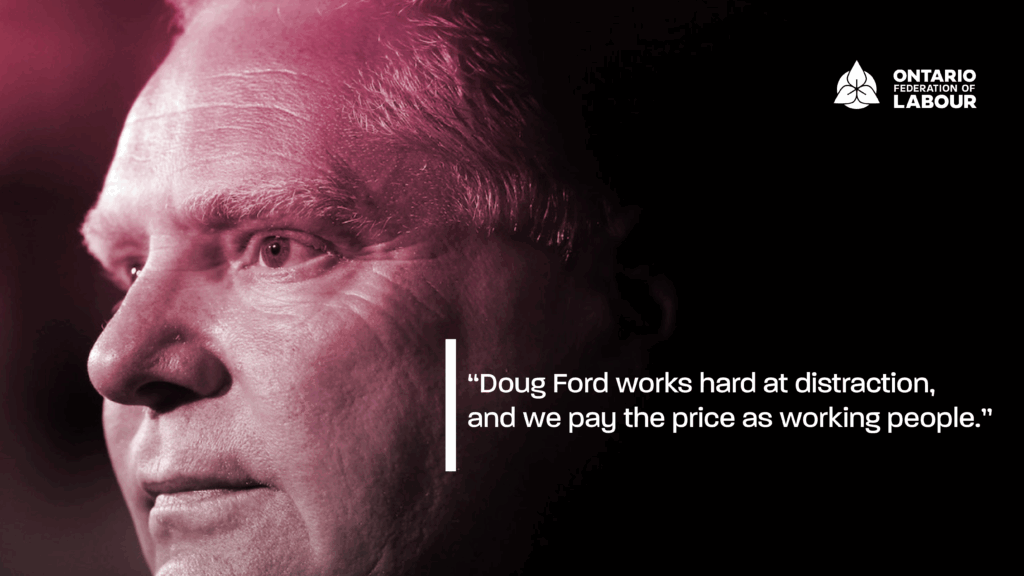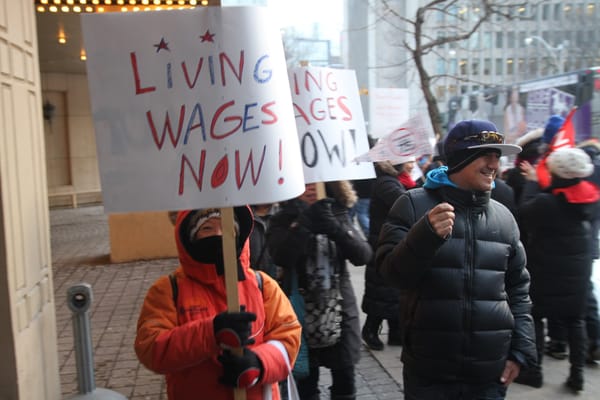
Last month, Hassan Yussuff stepped down as president of the Canadian Labour Congress (CLC), Canada’s central labour federation. Yussuff had held the presidential position since 2014.
The 63-year-old labour leader wasn’t out of a job for long. On June 22, Prime Minister Justin Trudeau officially announced the appointment of Yussuff to the Senate, along with James Quinn, chief executive of the Saint John Port Authority, and Bernadette Clement, the current mayor of Cornwall, and the first Black woman to hold a mayoralty in Ontario.
The Senate — that “chamber of sober second thought” specifically designed to contain democracy — has seen a slew of appointments under the Trudeau Liberals. Yussuff apparently believes he can advance the interests of workers from this unaccountable and undemocratic body. Such a position is in keeping with his record as head of the CLC, where insider connections and “pragmatic” politics stood in for the organization and development of working-class power.
Yussuff immigrated to Canada from Guyana and worked as a mechanic and auto parts worker before joining the United Auto Workers (now Unifor), and eventually becoming executive vice-president in 1999 and then secretary treasurer in 2002. He holds the not insignificant achievement of being the first racialized person to lead the CLC.
During his tenure at the CLC, Yussuff made a name for himself as a “pragmatic” leader, frequently lobbying politicians — particularly those in the Liberal Party — from inside the halls of power, as well as co-authoring policy think pieces with leading business figures. These two approaches — building connections with the Liberals and prioritizing policy advocacy over organizing — are perhaps Yussuff’s greatest legacies. Both stem from a strategic orientation that values political connections over building the power of the labour movement.
Yussuff maintains that his approach produced the goods for workers, despite the objections of his labour movement opponents. Following the announcement that he was stepping down, Yussuff remarked to the CBC: “I’m never going to apologize for the advancement of the interests of working people.” How much workers have advanced during the period of his leadership is questionable, to say the least.
During his time at the helm of the CLC, Yussuff seemed to go out of his way to build relationships with business leaders, claiming to find common ground on certain policy issues.
In June 2020, he jointly published an opinion article in the Toronto Star with Goldy Hyder, president and CEO of the Canada Business Council, calling on the government to prioritize child care in the post-COVID recovery. Formerly known as the Council of Chief Executives and the Business Council on National Issues, this vanguard of the rich and powerful has long been a key political player pushing for the deregulation, tax cuts and privatization that have been the hallmarks of neoliberalism since the early 1980s. Strange bedfellows, indeed.
Yussuff also partnered with Perrin Beatty of the Canadian Chamber of Commerce to write an article in the Financial Post defending the Canada Emergency Wage Subsidy, despite the fact that this ill-conceived pandemic program dished out billions to large corporations, many of them sitting on huge cash reserves, while also financially supporting businesses who are actively engaged in union-busting.
Yussuff’s “low-key but effective backroom deal-making,” as Leila El Shennawy put it in the Globe and Mail, earned him the continued praise of Beatty and the Chamber of Commerce — not exactly the endorsement one would expect for a labour leader.
Since ascending to executive roles in the CLC, there’s no question that Yussuff has made a prominent place for himself in the international arena. He served two terms as president of the Trade Union Confederation of the Americas and has been on the executive bureau of the International Trade Union Confederation, as well as being a member of the Ministerial Council of the Trade Union Advisory Committee to the Organisation for Economic Co-operation and Development (OECD).
Yussuff had also previously served in advisory roles on the NAFTA Council, the Task Force on Just Transition for Canadian Coal Power Workers and Communities, and the Net-Zero Advisory Body, all at the request of the federal Liberal Party.
This brings us to perhaps the most consistent objection to Yussuff’s leadership at the CLC: his cozy relationship with the Liberal Party — that party of “the middle class” with its penchant for legislating striking workers back to their unsafe and under-paid jobs.
Last October, Yussuff unilaterally issued an endorsement — also penned with the Chamber of Commerce — of former Liberal Finance Minister Bill Morneau in his bid to become secretary-general of the OECD.
This particular move drew the ire of most of the labour movement. The United Steelworkers, CUPW, CUPE and UFCW all issued statements objecting to both Morneau’s candidacy and Yussuff’s unilateral endorsement. Morneau has long been a proponent of pension cuts and moving away from defined-benefit plans, proposals which harm public and private sector workers and retirees, and were strongly opposed by most of the labour movement when tabled in the form of Bill C-27 in 2017.
Who could also forget when in 2016 Yussuff oversaw the first CLC Young Workers Conference and, as the guest of honour, invited none other than Trudeau himself. Needless to say, the young conference attendees were not as thrilled with Trudeau’s appearance as Yussuff, many of them turning their backs to the Prime minister as he made his awkward and truncated speech.
This softness toward the Liberal Party — often couched in the nebulous language of political pragmatism — is broadly characteristic not only of Yussuff, but also much of the Unifor leadership — who themselves caused Yussuff more than a few headaches during his time at the CLC.
In 2018, Unifor disaffiliated from the CLC amid a scandal involving accusations that the former union was engaged in “raiding,” i.e. attempting to displace the leadership of another union and take its members.
The issue at the time involved Bob Kinnear, then president of the Amalgamated Transit Union, Local 113, which represents workers at the Toronto Transit Commission, seeking new “Canadian” union leadership after the United States-based ATU placed his Local under “trusteeship.” When Kinnear’s collusion with Unifor came to light, the rest of Local 113’s executive eventually turned on him and he resigned.
All of this was awkward for Yussuff as a Unifor member, to say the least. At first he allowed the raid, but later backed down after objections from other CLC unions. He was then quietly issued membership in the Public Service Alliance of Canada and retained his place at the head of the CLC.
Further objections to Yussuff’s friendly relationship with Trudeau and the Liberals were on display at the most recent CLC convention earlier this summer, where the labour federation barely affirmed its continued support for the NDP in a vote garnering only 57 per cent support, against the objections of Yussuff.
Although the political alliance between the house of labour and the NDP have long been somewhat tenuous, Yussuff’s tenure at the helm only pushed the Party and the CLC further apart by encouraging “strategic voting,” a tactic that nearly always redounds to the benefit of the Liberal Party.
Nevertheless, it appears that Yussuff’s friendly relations with Trudeau and the Liberals are now paying off, for him anyway.
The lesson of Yussuff’s time in office at the CLC should be this: access to those in power is not the same as having power.
Despite minor expansions to the Canadian Pension Plan and recent reforms to the federal Canada Labour Code, in no real sense did Yussuff, the CLC and the broader Canadian labour movement exercise substantial influence over the federal government. For all of his ‘backroom dealing’ and hob-knobbing with politicians and business leaders, the past CLC president doesn’t have much to show in terms of material gains for workers or new organizational strength in the labour movement. Policy advocacy is important, but it’s no substitute for building working-class power.
There was a time, perhaps, when national labour leaders might have had some material impact on the decisions of the political class. Yussuff’s protestations to the contrary, that era has long since passed.
To whatever degree it was once true, such privileged access rested on the broader power of organized labour. Politicians took account of what labour leaders had to say because the latter represented a sizable portion of the overall working class who could, potentially, exercise real power. The threat of the organized working class is what made labour leaders into voices of concern.
The approach of Yussuff and other labour leaders like him has this dynamic entirely backward. To such figures, political access is a substitute for the organized power of labour, not its result. The consequence of this is that moderation, cooperation and concession are emphasized in order to maintain political access. Disruption and militancy risk antagonizing your political ‘friends.’
No labour movement worth its salt was ever built on tepid alliances with workers’ smiling enemies. Workers need to be organizationally strong enough to force politicians to do the things that privileged political access and policy op-eds never could.







